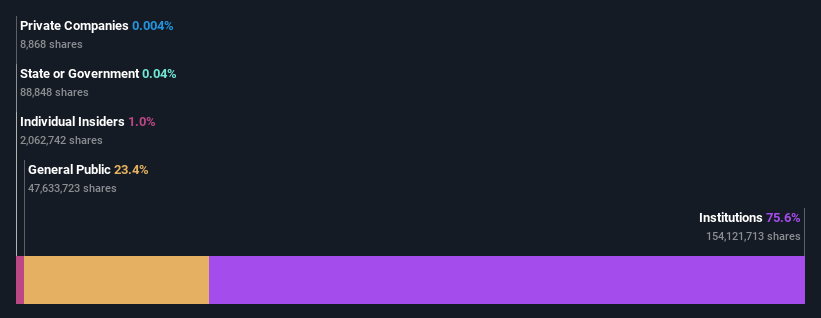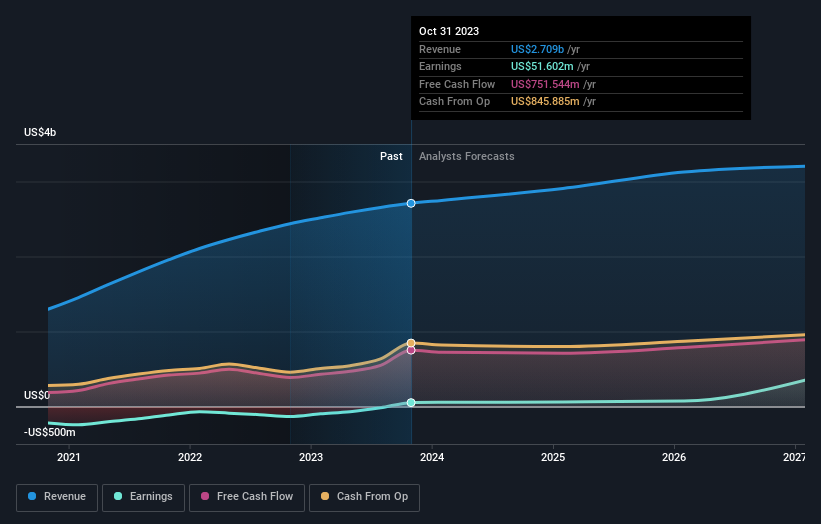- United States
- /
- Software
- /
- NasdaqGS:DOCU
In the wake of DocuSign, Inc.'s (NASDAQ:DOCU) latest US$414m market cap drop, institutional owners may be forced to take severe actions

Key Insights
- Significantly high institutional ownership implies DocuSign's stock price is sensitive to their trading actions
- A total of 25 investors have a majority stake in the company with 51% ownership
- Analyst forecasts along with ownership data serve to give a strong idea about prospects for a business
Every investor in DocuSign, Inc. (NASDAQ:DOCU) should be aware of the most powerful shareholder groups. The group holding the most number of shares in the company, around 76% to be precise, is institutions. In other words, the group stands to gain the most (or lose the most) from their investment into the company.
As a result, institutional investors endured the highest losses last week after market cap fell by US$414m. Needless to say, the recent loss which further adds to the one-year loss to shareholders of 17% might not go down well especially with this category of shareholders. Often called “market movers", institutions wield significant power in influencing the price dynamics of any stock. As a result, if the downtrend continues, institutions may face pressures to sell DocuSign, which might have negative implications on individual investors.
Let's delve deeper into each type of owner of DocuSign, beginning with the chart below.
View our latest analysis for DocuSign

What Does The Institutional Ownership Tell Us About DocuSign?
Many institutions measure their performance against an index that approximates the local market. So they usually pay more attention to companies that are included in major indices.
We can see that DocuSign does have institutional investors; and they hold a good portion of the company's stock. This implies the analysts working for those institutions have looked at the stock and they like it. But just like anyone else, they could be wrong. When multiple institutions own a stock, there's always a risk that they are in a 'crowded trade'. When such a trade goes wrong, multiple parties may compete to sell stock fast. This risk is higher in a company without a history of growth. You can see DocuSign's historic earnings and revenue below, but keep in mind there's always more to the story.

Institutional investors own over 50% of the company, so together than can probably strongly influence board decisions. We note that hedge funds don't have a meaningful investment in DocuSign. The company's largest shareholder is The Vanguard Group, Inc., with ownership of 10%. For context, the second largest shareholder holds about 6.5% of the shares outstanding, followed by an ownership of 4.5% by the third-largest shareholder.
After doing some more digging, we found that the top 25 have the combined ownership of 51% in the company, suggesting that no single shareholder has significant control over the company.
While it makes sense to study institutional ownership data for a company, it also makes sense to study analyst sentiments to know which way the wind is blowing. There are plenty of analysts covering the stock, so it might be worth seeing what they are forecasting, too.
Insider Ownership Of DocuSign
The definition of an insider can differ slightly between different countries, but members of the board of directors always count. Company management run the business, but the CEO will answer to the board, even if he or she is a member of it.
Insider ownership is positive when it signals leadership are thinking like the true owners of the company. However, high insider ownership can also give immense power to a small group within the company. This can be negative in some circumstances.
Our most recent data indicates that insiders own some shares in DocuSign, Inc.. It is a very large company, and board members collectively own US$106m worth of shares (at current prices). It is good to see this level of investment. You can check here to see if those insiders have been buying recently.
General Public Ownership
The general public-- including retail investors -- own 23% stake in the company, and hence can't easily be ignored. This size of ownership, while considerable, may not be enough to change company policy if the decision is not in sync with other large shareholders.
Next Steps:
I find it very interesting to look at who exactly owns a company. But to truly gain insight, we need to consider other information, too. To that end, you should be aware of the 1 warning sign we've spotted with DocuSign .
If you are like me, you may want to think about whether this company will grow or shrink. Luckily, you can check this free report showing analyst forecasts for its future.
NB: Figures in this article are calculated using data from the last twelve months, which refer to the 12-month period ending on the last date of the month the financial statement is dated. This may not be consistent with full year annual report figures.
New: Manage All Your Stock Portfolios in One Place
We've created the ultimate portfolio companion for stock investors, and it's free.
• Connect an unlimited number of Portfolios and see your total in one currency
• Be alerted to new Warning Signs or Risks via email or mobile
• Track the Fair Value of your stocks
Have feedback on this article? Concerned about the content? Get in touch with us directly. Alternatively, email editorial-team (at) simplywallst.com.
This article by Simply Wall St is general in nature. We provide commentary based on historical data and analyst forecasts only using an unbiased methodology and our articles are not intended to be financial advice. It does not constitute a recommendation to buy or sell any stock, and does not take account of your objectives, or your financial situation. We aim to bring you long-term focused analysis driven by fundamental data. Note that our analysis may not factor in the latest price-sensitive company announcements or qualitative material. Simply Wall St has no position in any stocks mentioned.
About NasdaqGS:DOCU
DocuSign
Provides electronic signature solution in the United States and internationally.
Undervalued with solid track record.

